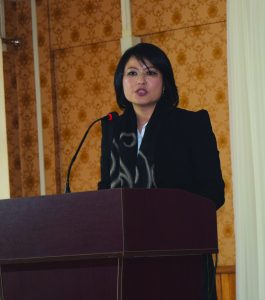Nagaland
‘33% reservation does not impinge upon Article 371 A’

KOHIMA, NOVEMBER 24 : As per the October 21, 2011 judgement and order of the Single Bench of Gauhati High Court, Kohima Bench, implementation of 33% reservation for women does not in any way impinge upon Article 371 A of the Constitution of India, noted Chief Judicial Magistrate, Kohima, Mezivolu T Therieh.
Quoting Para 28 of the judgement, Therieh said ‘it would be appropriate to note that Article 371A provides special provision with respect to the state of Nagaland to the effect, amongst others, that notwithstanding anything in the Constitution, no Act of Parliament in respect of (i) religious or social practice of the Nagas (ii) Nagas customary Law and procedure (iii) administration of civil and criminal justice involving the decisions according to Naga Customary law (iv) ownership and transfer of land and its resources, shall apply to the State of Nagaland unless the Legislative Assembly of Nagaland by resolution so decides. It is needless to state that no act of Parliament is involved in the instant case and the Act and the Amendment Act of 2006 containing reservation of, amongst others, women in Section 23A flows from the provisions contained in the Constitution of India’.
Therefore, not holding municipal elections with 33% reservation for women is discriminatory and in fact impinges upon the rights of the women, she said at the launching programme on elimination of violence against women in Kohima on Thursday.
Noting that there is a massive political injustice taking place in the State, she noted that even after more than 50 years of statehood, there is not any elected woman representative in the decision-making bodies.
“Because the society limits women,” she said while pointing out that the Constitution of India has granted one third seats reserved for women in the municipalities, a constitutional mandate under Article 243T (3) of the Constitution.
The CJM lamented that the State is yet to see the implementation of this constitutional mandate, for which JACWR was compelled to break down such stereotype thinking that hinders women participation.
Therieh asserted that if Nagaland is to have municipalities, then reservation of seats for women is binding by direct elections and allotted by rotation to different constituencies in municipalities.
She also made clear that the provision of law does not allow nominees with voting rights except the elected legislators and the elected members of the municipal council.
While in the garb of stating that women are treated equally in our sincerity and such reservations are alien in our culture, Therieh said: “Injustice cannot be done to the right we truly deserve as mandated in the Constitution.”
Asserting that this is not a fight between men and women but it is to empower women for their uplift and enable them to contribute towards the development and progress of the society, Therieh strongly felt that there should be social, economic, psychological and political justice.
“Only then we can say that gender justice is achieved and claim that men and women are treated alike and no discrimination exists,” she added.

